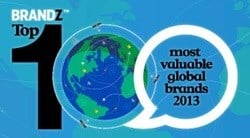Being African, the continent's under-performance leaves me blue. As I look into the reasons behind the poor showing by African brands it has just dawned on me that 'Brand provenance matters, doesn't it?'
Provenance is a vital component to brand success
Just like you and me, a brand needs a good home - what marketers call brand provenance. A brand's provenance is its origin and history. Provenance is key for brand leverage - more so within the categories dominating the 2013 rankings: technology, automotive, financial services and the luxury brands.
Consumers, especially those with little experience in a category use provenance as a shorthand for brand quality and authenticity. Its influence on brand choice should therefore never be underestimated.
Consumers consider certain countries to be the authentic producers of a given category of products. Brands that are associatively connected with countries that have a clear product-related reputation in consumer memory have an edge over brands that originate from countries where the reputation is non-existent. Apple is therefore not being naïve when it engraves 'Designed in California' instead of 'Made in China' (where its phones are actually assembled) on its smart phones. The idea is to have provenance on its side as Silicon Valley is the birthplace of tech entrepreneurship.
Automobile brands that adorn the top global brand list originate from countries renowned for making cars. BMW and Mercedes for instance are from Germany, a country reputed for its reliable and structurally efficient cars. Meanwhile, Japan is home to the economical and durable Toyota and Honda brands. The UK and USA are home to most of the top financial services brands. Thanks to their long history of stability.
The lack of a globally recognized product-related reputation is one of Africa's nightmares as far as its performance at the grand best global brand stage is concerned.
The Anholt Nation Brand Index (NBI) study, which monitors country image, indicates that countries that largely perform in the top quartile of the measure also happen to be home to top global brands. This has significant implications to Africa and its brands.
Africa's poor image is a liability to its brands
Even if the hard points of capital and infrastructure are set aside, Africa's image still hurts the prospects of its brands on making it to the top global stage.
Some argue that Africa is made up of many countries with each country having its own distinct image. While this is to some extent true, the image that is however primarily perceived globally is that of Africa. In the past decade Africa's image has been largely negative, being associated with poverty, wars, diseases, and dictatorships - all ills affecting mankind.
In 2000 the Economist coined the continent 'Hopeless Africa'. A decade on, this stereotype of Africa sadly still lingers. Not for unfounded reasons. According to the 2013 Transparency International Poll on corruption out of the 12 most corrupt countries in the world, 10 are on the African continent.
The Economist Intelligence Unit 2012 report gives a grim picture of democracy on the continent. Out of all the African Countries it monitored (around 50 of them) only Reunion reportedly fits the description of 'a full democracy'. The rest are flawed democracies, hybrid regimes or authoritarian. And in the 2010 Anholt Nation Brand Index report 83% of the African countries monitored performed in the bottom half segment of the total number of countries surveyed versus only 17% in the top half segment.
Such statistics point to huge image issues still dogging Africa - making the continent come short of being a world-class home for its people and hence its weak performance in the top global brand rankings. Top Global Brands tend to originate from nations that are highly admired globally.
Africa's growing economy ushers in hope for its brands
Recent reports show that Africa's economy is growing at 4.5% on average - one of the fastest in the world. Five of the top 10 fastest growing economies are in Africa. With the continent's economy looking up things can only get better.
The Economist which called Africa the 'Hopeless Continent' in 2000 made a U-turn on its perspective of the continent in 2013. It now calls Africa a 'Hopeful Continent' - noting that incidence of dictatorship and hunger are coming down.
Africa's image is undoubtedly on the mend. The growing economy is leading to a burgeoning middle class that is demanding improved quality of goods and services. The 2013 UN Sustainable Development Solutions Network World Happiness Survey, which essentially monitors people's well-being globally, indicated that 62% of the African countries surveyed are happier than they were five years ago. Only 38% reported declining happiness. This suggests that Africa's growing economy is having an impact as part of its citizenry perceives a sense of social progress.
Yet, a growing economy in itself is not a guarantee for success in the chaining out top global brands. This is evidenced by the experience of the Asian giants: China and India which have been recording phenomenal economic growth since the past decade but are yet to make a real mark on the top global brand scene.
Good governance and nation's integrity play a significant part. The African nation needs to be the envy of other nations if its brands are to attract a significant clientele outside the home market. It is in this sense that Africa's current image requires significant face-lifting for the continent to become a reputable provenance for leading brands.
Finally, it's time to build brands that tell an African story
'Africa Rising' is now a common phrase used on most talk shows on Africa today. Indeed Africa's economy is growing but the growth is flawed. The growth is largely driven by the trade in commodities like minerals which are a finite resource. Commodities by their nature will not earn the continent maximum return-processed, goods do.
Africa needs to completely morph from being a world supplier of raw materials into being a real global competitor in finished goods if it is to obtain full benefits from its resources and in the process become provenant to world-class brands. This is no easy feat as it calls for smart branding. Astute branding that cuts through the noise made by a number of formidable global brands - to reach a diverse audience out there.
Despite its baggage of image issues, Africa has an enchanting, magical side that its brands can use as leverage. The continent is home to a diverse wild life, huge mineral resources and an array of classic natural and man-made sites. These draw multitudes of business and holiday global visitors each year, and depending on the nature of the product category being marketed, can be used to celebrate a brand's African heritage - especially where the brand has to appeal to number of diverse cultures.
A more likeable and inspiring image
In asserting its African provenance, a company needs to establish the perceptions its targeted customers have of Africa first. In other words, what emotionally attaches its target consumers to Africa and also determine how its brand connects to these emotions and then build its brand provenance story around that. Simply pasting African symbols as logos and labels on packaging without a compelling and engaging story behind them does not bring the brand's provenance story to life.
To fare better on the 100 Best Global Brands, Africa needs to make its image more likeable and inspiring. It is also vital that the continent gradually wean itself from the trade in commodities into trading in finished products and within the process establish product-related reputation in a number of key selected sectors. Expert branding that can build Africa's magical side into the brand associative network will also be required.
The African economy is rapidly growing amidst Western slowing economies. Western countries primarily dominate the top global brand rankings. So the tide is on Africa's side.























